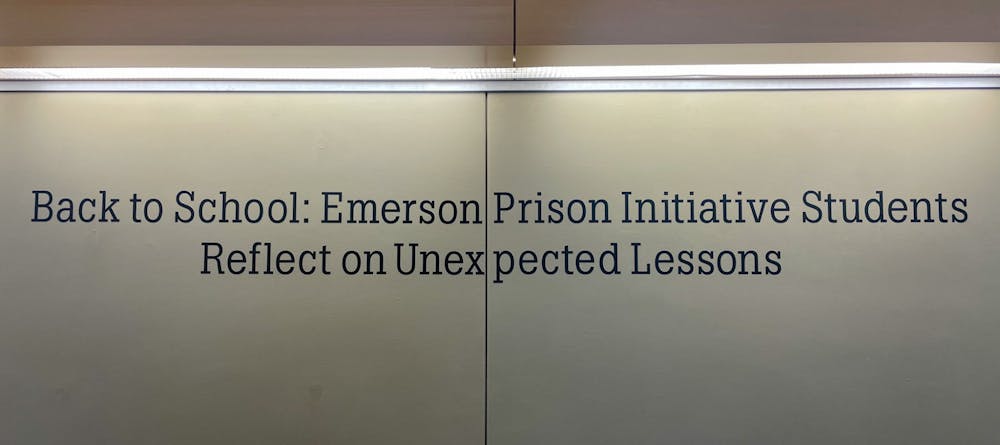For just over a month, essays written by currently and formerly incarcerated college students have lined the walls of the second floor of the Watson Institute for International and Public Affairs as part of an 11-week exhibition titled “Back to School: Emerson Prison Initiative Students Reflect on Unexpected Lessons.”
The exhibition was made possible through a partnership between the Watson Institute and the Emerson Prison Initiative, an Emerson College program providing students who are incarcerated at the Massachusetts Correctional Institution at Concord “with an opportunity to earn a bachelor’s degree in media, literature and culture from Emerson College.”
Cara Moyer-Duncan, assistant director of the Emerson Prison Initiative, wrote in an email to The Herald that “EPI believes that access to a high-quality education that recognizes the potential of … each human being is a fundamental right.”
“The public policy conversation around increasing access to college in prison often focuses on recidivism and employment,” she added. “Those things are no doubt important, but what we see with these essays is something different.”
An essay from the exhibition titled “Resurrection of Sight” written by Mac Hudson describes his experience gaining access to a college education through the metaphor of gaining sight for the first time. His education through EPI, Hudson wrote, “challenged the limitations of my mind, my thinking, my writing, to find the right idea. The right words to express myself.”
He also wrote that a college education allowed him to access “state resources” — something he could not do before.
“We see the impact on incarcerated college students as readers, thinkers and creators … and as civically engaged members of the communities they belong to,” Moyer-Duncan wrote. “These essays reveal the transformative power of education, which can allow incarcerated people … to imagine and realize different possibilities for themselves.”
According to Ahmad Bright’s essay, “Portraits of Progress,” EPI also opens up a new community for participants.
“I had never before felt a sense of shared experience and camaraderie as I did during those 18 months of learning, growing and sharing with my classmates,” he wrote.
Angelina Rios-Galindo ’25, a member of the Stop Torture RI coalition focused on reforming long-term solitary confinement in Rhode Island, told The Herald that the Watson Institute, the Ruth J. Simmons Center for the Study of Slavery and Justice and the Center for the Study of Race and Ethnicity in America have all been working together in recent months to “bolster the conversation surrounding mass incarceration.”
Rios-Galindo acknowledged the “duty of care” necessary when bringing discussions regarding incarceration to the University.
“Most crucial is centering the ideas, experiences, needs and strengths of system-impacted folks and (creating) avenues of support for those that are sharing their stories,” she said.
“The University should increasingly make information and stories accessible, ethically sourced and candid,” she said. “And the folks whose stories are being shared must be involved in the entire process, included in additional discourse surrounding EPI, and (be) credited for their work.”
Mikael Oberlin ’25, a student who visited the exhibition, said that the EPI-Watson partnership was his first time being exposed to the stories of incarceration from those with “direct experience.”
“I feel like oftentimes, narratives surrounding incarceration are delivered through mediums not best equipped to tell the stories,” he said. “Like TV shows or movies set in prisons, or even professors, who can’t relate to any of the experiences, trying to present them … but just end up sounding out of touch.”
“I’m grateful to have information to educate … us from the actual source on campus,” he added.
Both Oberlin and Rios-Galindo emphasized the exhibition’s focus on individuals, acknowledging that different people have different experiences with incarceration.
“It’s not a one-size fits all thing,” Oberlin said.
Rios-Galindo encouraged students to visit the exhibition to learn about “the effects and pervasiveness of mass incarceration.”
“Read something that centers redemption, rather than powerlessness or oversight or the stripping of individuality,” she said. “Ground yourself in the reality of someone else’s experiences.”
Other opportunities for students to learn about incarceration at the University, Rios-Galindo said, include the CSREA’s Mass Incarceration Lab or engagement with the Stop Torture RI coalition and other local advocacy groups.
The exhibition will be open to the public through June 7.

Sofia Barnett is a University News editor overseeing the faculty and higher education beat. She is a junior from Texas studying history and English nonfiction and enjoys freelancing in her free time.





